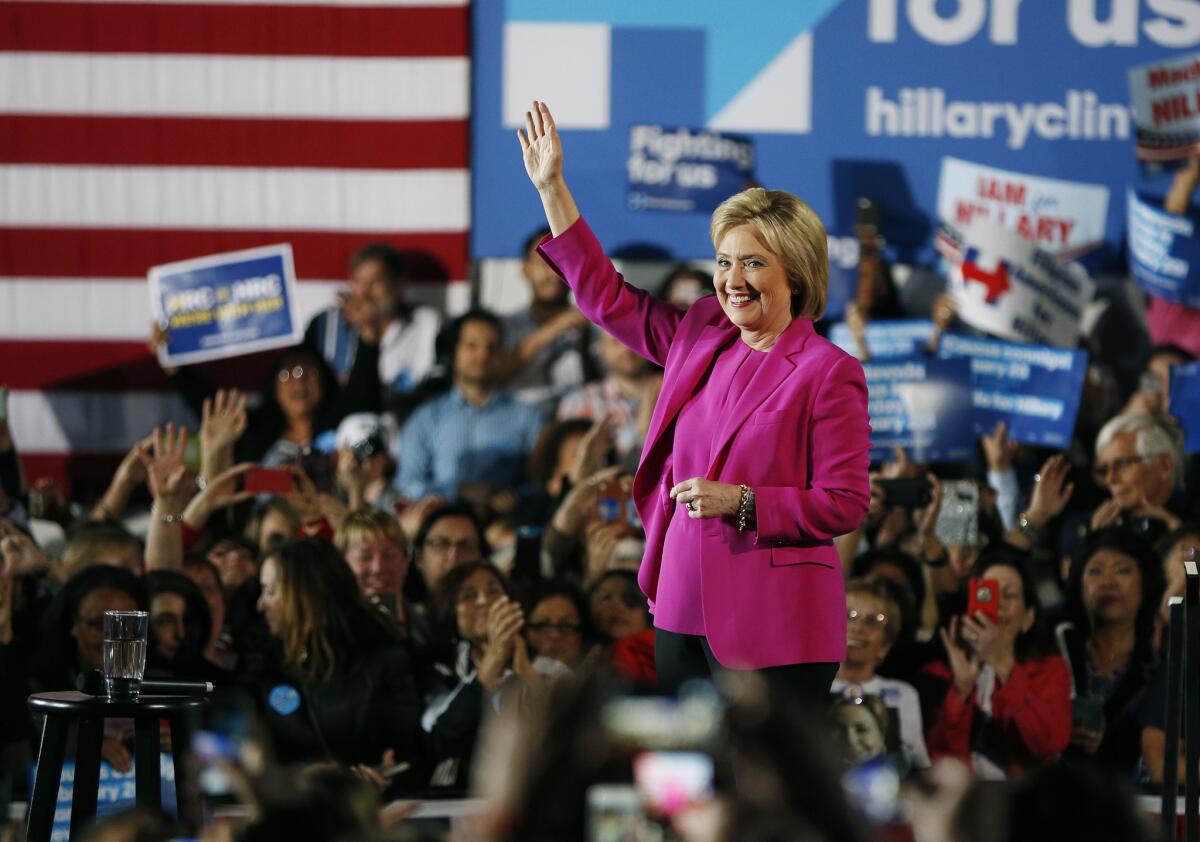Analysis:: Will Nevada caucuses be Clinton’s firewall or Sanders’ proving ground?

Hillary Clinton campaigns Thursday in Las Vegas. She has seen her sizable lead in Nevada polls all but vanish.
Reporting from Las Vegas — Hillary Clinton has done just about everything right ahead of Saturday’s caucuses in Nevada.
She began organizing early, visited the state repeatedly, hired some of its most talented political professionals and cultivated broad support from organized labor, Democratic leaders and the party’s grass roots.
But Clinton made one glaring mistake: She failed to take Bernie Sanders seriously enough.
Most crucially, she allowed him to dominate the television airwaves in the state starting in December and continuing through his momentum-building performances in the first two presidential nominating contests in Iowa and New Hampshire.
Now Clinton’s once-sizable lead in voter surveys has all but vanished, and both sides are bracing for a close finish.
“Nevada has become a highly contested race and could either be Clinton’s firewall or Sanders’ proving ground,” said Rebecca Lambe, a top strategist for Democratic Senate leader Harry Reid of Nevada, who has not taken sides.
It is far too soon to talk in terms of political life and death, or other such melodramas.
But a loss in Nevada, which once seemed almost inconceivable, would do grave harm to Clinton and establish the Vermont senator as more than a charmingly irascible distraction en route to her certain nomination.
Even a close Sanders finish could raise strong doubts about Clinton’s candidacy, especially if he manages to cut deeply into her presumed base among Latino, black and Asian American voters.
In a last sprint Friday, Clinton sought to bolster her support among women and Latinos. Appealing to both, her latest TV spot featured a scene from a meeting last weekend in East Las Vegas, where Clinton hugged a young girl who was afraid her parents would be deported. “Let me do the worrying,” Clinton said.
Sanders took his populist message to rural Nevada.
He spoke Friday at a town-hall event in Elko, calling for a higher federal minimum wage and free college tuition — two hallmarks of his campaign. “This is not a radical idea,” he said.
Nevada has none of the storied history of Iowa’s caucuses or New Hampshire’s primary. But the vote here could go much further than either of those contests in shaping an increasingly unpredictable fight for the Democratic nomination.
The only other time Nevada mattered this much in the primary season was in 2008, the first time it held its early caucuses, when Clinton and Barack Obama fought to a split decision; Clinton won the popular vote while Obama edged her in the delegate count.
As in other early states, the fight here is less about delegates — there are only 43 at stake, out of nearly 2,400 needed to win the nomination — than expectations and perception.
Had Clinton handily carried both Iowa and New Hampshire, the fight for the nomination would have essentially ended, even if Sanders continued campaigning. But Sanders nearly beat Clinton in the Iowa caucuses, and then won New Hampshire in a landslide the next week.
Each of those setbacks came with caveats, however, or at least a rationale that Clinton and her supporters could use to explain away concerns. Iowa is overwhelmingly white and its Democrats have a broad progressive streak, which helped the more liberal Sanders. New Hampshire borders Vermont, giving Sanders an advantage as a next-door neighbor.
That is why, even though many were stunned by the size and breadth of Sanders’ New Hampshire victory, there was nervousness but not full-fledged panic within the Democratic establishment, which strongly leans in Clinton’s favor.
Nevada is different.
This vast desert state was supposed to be Clinton’s fail-safe, or firewall, decisively stopping the Sanders conflagration before the flames spread.
“Clinton country” is how Dina Titus, the congresswoman from Las Vegas and a supporter of the former first lady and secretary of State, describes it.
Bill Clinton, running as “a different kind of Democrat” — which is to say a relative moderate — carried the state both times he ran for president. Hillary Clinton took vestiges of his support and remnants of her 2008 political organization and bolstered them by hiring veterans of Obama’s successful campaigns here.
She also enjoyed a huge advantage over Sanders in name recognition and, it was believed, an enormous edge among minority voters, who have been Clinton loyalists going back to her husband’s years in the White House.
That is why the stakes have grown so high.
Already facing doubts about his electability, a poor showing would send Sanders limping into the primary next weekend in South Carolina, where he is already the underdog, and after that the sprawling set of contests stretching nearly coast-to-coast on March 1.
For most Nevadans, the caucuses will be an afterthought; only a small fraction of eligible voters are expected to turn out on a sunny Saturday afternoon.
But the outcome could go a long way toward determining whether Clinton’s firewall holds, or the Sanders insurgency blazes on brighter and stronger than before.
Follow @markzbarabak for national & California politics
MORE ON CAMPAIGN 2016
Hillary Clinton faces one problem she didn’t expect: Money
Latinos seek answers from Sanders and Clinton in Las Vegas
Trump and Pope Francis clash over immigration, another extraordinary campaign twist
More to Read
Sign up for Essential California
The most important California stories and recommendations in your inbox every morning.
You may occasionally receive promotional content from the Los Angeles Times.











